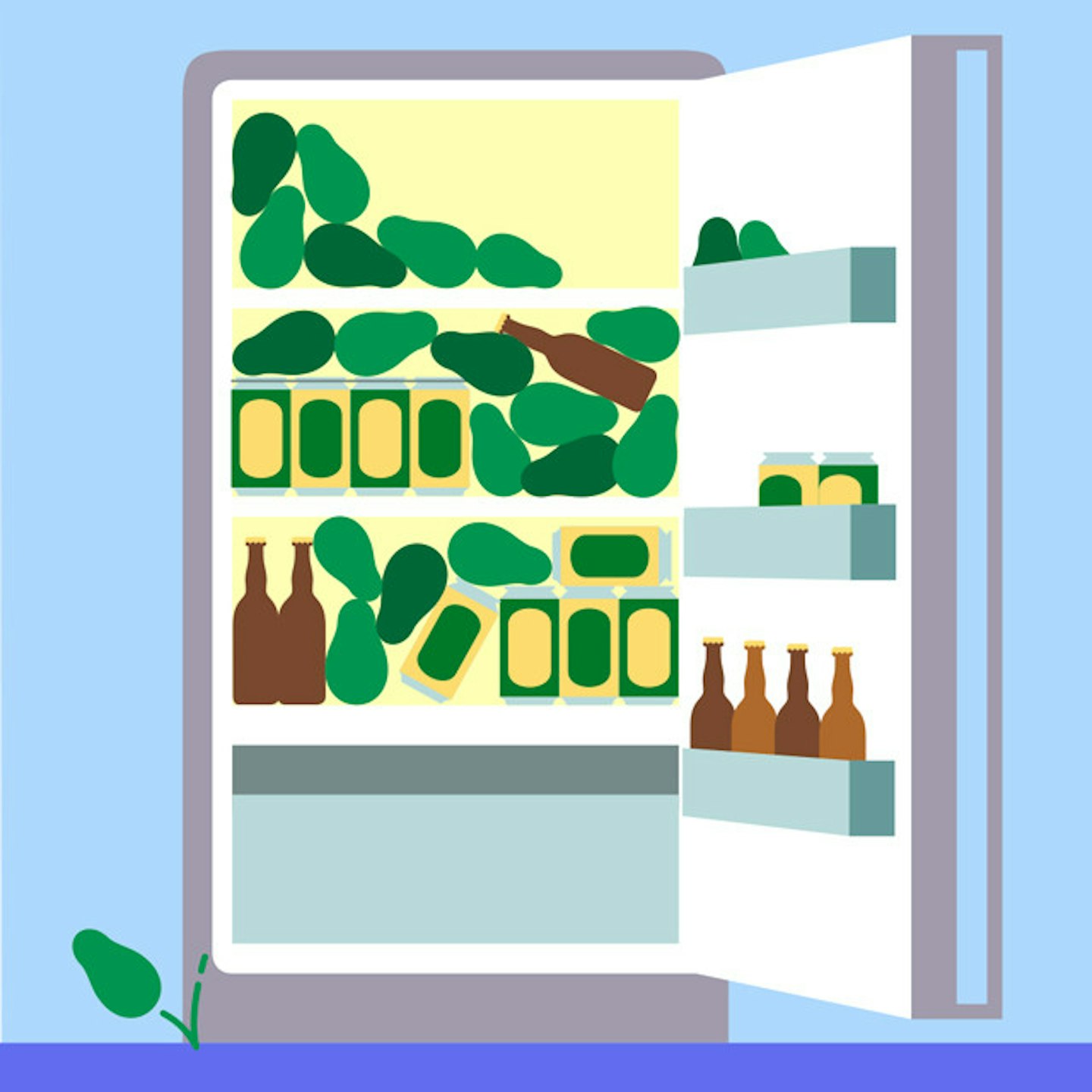‘I suppose I drink a lot, but then so does everyone around me,’ says Ellie*, 25. When she goes out (mainly to house parties), as well as smoking a few cigarettes, ‘I’ll probably do a couple of lines of coke, it’s not unusual for me to get home at 7am.’
Hangovers, she says, will be sated with ‘bouji fried chicken and chips’.
Typical caner, right? Wrong. Ellie’s a fitness trainer, and, as well as doing ‘at least one class of spinning, yoga or HIIT [high intensity interval training] a day’, earns a living teaching people how to keep healthy. So she spends her weeks healthy and her weekends going off-kilter. As for that fried chicken? It’s a break from the Monday to Thursday routine where ‘I eat what can roughly be described as paleo: meat, fish and lots of vegetables. Even for breakfast. And I’ve recently cut all forms of sugar except berries.’

Meet Generation Offset. Spend your week spiralising courgettes, chugging green smoothies and going to the gym, but once Friday hits, get straight onto the booze, drugs and cigarettes, getting messed up all night. Sunday is spent half couch-bound, half-preparing those extra lean packed lunches for the week. The mindset is that temperance cancels out the bingeing, with the end result being that you're a perfectly balanced human being. You can look great and enjoy all those YOLO moments getting drunk with your mates.
The unofficial figurehead of this behaviour is Miley Cyrus. A quick scroll through her Instagram and you’ll find odes to avocadoes and grilled sprouts interspersed with spliffs and house parties. The message is clear: you can dance with molly (MDMA), but do eat your greens.
Living for the weekend is nothing new, but while millennials at the younger end are drinking less, smoking less and being a bit more responsible, us older lot are still caning it. With the introduction of calories listed on food packaging, recommended alcohol units, 5:2, 5 A Day, and rising cigarette taxes, we’ve grown up thinking behaviours and vices can be measured in numbers. Add a few on here, take away a couple there, and the scales are rebalanced again. In the same way we’ll justify buying an expensive T-shirt, because, well, we saved so much in that Topshop sale last week, we’re offsetting our lifestyle, living double lives in the process.
It’s worth nothing that while our predecessors might have never known what ‘clean-eating’ and ‘wellness’ were, the hype around kale juices and cauliflower-based pizzas gives Generation Offset a hefty sense of conviction that superfoods and their ilk are so spectacularly nutritious, they can properly undo the damage of a weekend’s raving.

When I ask Ellie what makes her do this offsetting, she replies, ‘Internal guilt. There’s a constant push-pull between wanting to be healthy and enjoying my youth whilst I still can.’
And she knows she's not alone in this. ‘ I think there’s a particular pressure, perhaps derived from Instagram, on young women to have the resilience to do everything at once.’
Our mothers were taught that liberation came from having it all, and that this meant having things – a job, a house, a husband, kids. But could it be that, for younger women, we’re getting suckered into Generation Offset because ‘having it all’ now means being so many different things?
A study by Harris and gig company Eventbrite looked into the lives of (OK, yes, American) millennials and found that, ‘For this group, happiness isn’t as focused on possessions or career status. Living a meaningful, happy life is about creating, sharing and capturing memories earned through experiences that span the spectrum of life’s opportunities.’
We’re getting suckered into Generation Offset because ‘having it all’ now means *being* so many different things
The biggest difference between American and British millennials lives is the UK’s housing crisis, which means that, more young people than ever have given up on the dream of owning their own place. Without the same long-term design for life in place, we’re freed up to indulge ourselves in what we enjoy: experiences. Bettsy Dillner, director of Generation Rent, tells The Debrief, ‘The escalating cost of owning your own home and the unappealing alternative of short term tenancies paints a bleak future for today’s twenty-somethings. When the housing crisis has thrown life’s certainties out the window, it’s not a surprise that many see no point in putting money aside and instead live for the moment.’
Persia Lawson, the 28-year-old co-founder of Addictive Daughter, a life coaching service for young women going through the Quarter Life Crisis, gets this. ‘I’ve definitely seen this as a culture. As Generation Rent, we know we’ll never earn more than our parents so there’s a lot of despondency.’
She adds, though, ‘Yet, you can justify offsetting, denying yourself, saving up credit for the weekend, but by Sunday you’ll feel shit.’
A recent study by the Office of National Statistics found that the number of those aged 16-24 saying they don’t drink has risen by 40% since 2005. But there were flaws to this study. Unaccounted-for Muslims who devoutly refuse alcohol could’ve skewed the results. And assuming booze isn’t a problem anymore stops us all from questioning our own problematic vices. It would be ‘dangerous to look at this survey and say, “Yes, people are drinking less,”’ says Prof Mark Bellis, spokesman for the Faculty of Public Health.

While 40% those in that ONS study said getting drunk is ‘embarrassing’, that’s because they’re the slightly younger millennials have spent their entire young adulthood being aware of the constant surveillance of social media. For those who began the hedonism of drinking, smoking and drug-taking when phones were all green-and-black screened Nokias, and texts were 12p a pop, we've lived it large enough at the weekend enough times to know it doesn’t have the crushing comeuppances that scare off our younger peers.
It's obvious, but worth reminding ourselves of the fact that short-term wins of Generation Offset can have terrible long-term consequences.
‘I used to eat no carbs all week, avoid sugar at all costs and then go out all weekend and smash it,’ says Steph*, 27.
‘It ended really badly when I had a breakdown. I’d thought I was being “healthy”, but ended up realising that I had a drink and drug problem.’
‘I’d totally believed my own bullshit. I thought it was unfair I wasn’t thinner, didn’t’ look healthier and always felt tired. Turns out not eating a fucking burger doesn’t cancel out ten bottles of wine and a few grams of coke.’
Steph says that, while going to AA meetings, she noticed ‘way more young people than I expected’.
Going on a health-kick in the week simply to look good when getting nailed at the weekend is a worrying trend Persia recognises in her Generation Offset clients. ‘A lot of eating healthy during the week is more about looking good when they do go out.’
Priya Tew, a spokesperson for the British Dietetic Association tells The Debrief, ‘The concept of restricting intake of foods then having binge days isn’t healthy at all. You want people to find a nutritious balance – it’s OK to have a cake or a drink, but so long as it’s portion controlled.’
As for the increasing ways in which we can all count the calories and convince ourselves we’re able to cheating the maths, Priya explains, ‘You can get too hung up on the numbers and take them as an absolute. It’s important to know what’s in your food and make an informed choice, but we don’t want people working off of a spreadsheet.’
The concept of restricting intake of foods then having binge days isn’t healthy at all. You want people to find a nutritious balance
It’d be unfair to say that women are the only people affected by this offset culture – binge-drinking, smoking and drug-taking takes a serious toll on British men, who so frequently escape the judgment women are given for getting boozed up.
However, owing to a certain ladette-fuelled form of liberation, there’s a space in our culture for women to be a member of Generation Offset without judgment.

Remember Gone Girl’s ‘Cool Girl’? The protagonist Amy Dunne describes her like this:
‘She’s a hot, brilliant, funny woman who adores football, poker, dirty jokes, and burping, who plays video games, drinks cheap beer, loves threesomes and anal sex, and jams hot dogs and hamburgers into her mouth like she’s hosting the world’s biggest culinary gang bang while somehow maintaining a size 2, because Cool Girls are above all hot. Hot and understanding. Cool Girls never get angry; they only smile in a chagrined, loving manner and let their men do whatever they want. Go ahead, shit on me, I don’t mind, I’m the Cool Girl.’
Most analysis of the Cool Girl has been about her sex drive. But look at the stuff about the burgers and the beers and the ‘maintaining a size 2’. While women have been given the very modern freedom to gallivant about like men, we still have the same old pressures to remain looking extra-beautiful. Where does this contradiction leave us?
Generation Offset. The phenomenon could die out with younger generations bypassing all the hedonism (it’s expensive, embarrassing and eats into their ever-valuable time), but the odds of it being dropped by those of us already in the mid-twenties routine of ying and yang seem thinner than a Nutribullet-ed kiwi. Our rewards systems are now so short-term that, instead of looking to the longer side effects of our topsy turvy lives, we’ll place value on what we get Instagram ‘likes’ for, or whatever helps us be it all at the same time. And, so long as the fuzzy image of a house party come 4am gets the hearts, and there are double taps for the super-green sprouting salad, Generation Offset is here to stay.
Like this? You might also be interested in:
'My Friends Thought I Just Drank Too Much, But Actually I Was Bulimic'** **
Meet The Girl Who Tried 10 Diets In 10 Weeks To Challenge Our Ideas Of Perfection
Follow Sophie on Twitter @sophwilkinson
*names have been changed
Illustrations by Michael Arnold
This article originally appeared on The Debrief.
